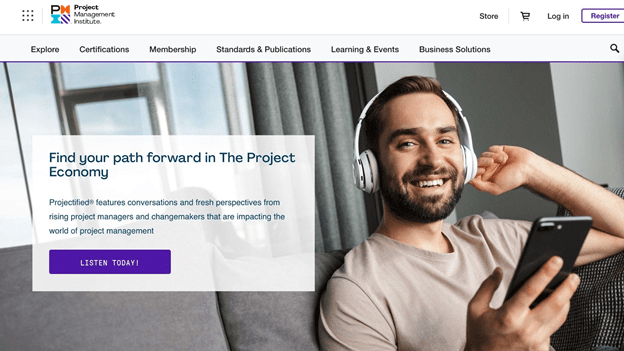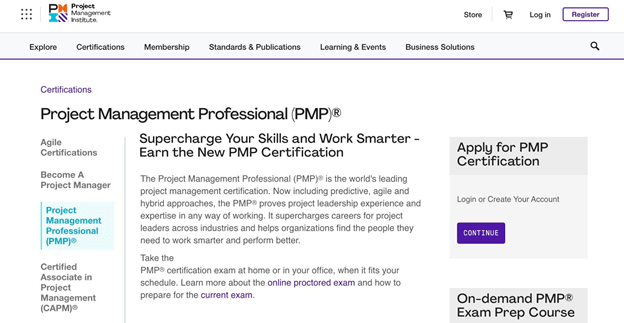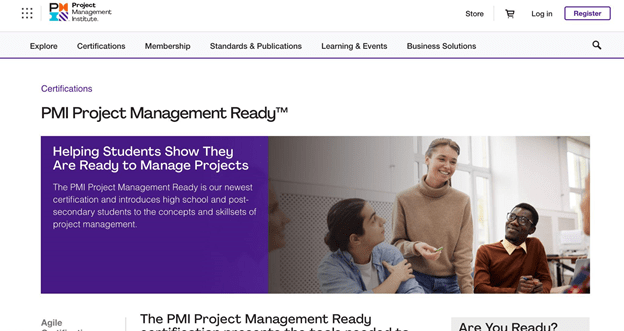The Ultimate Manual to Project Management Institute
Are you interested in becoming a project manager? Or are you looking to improve your project management skills in your current role? Either way, taking your skills to the next level is something you may want to consider doing.
Having well-developed project management skills can make you a strong candidate for positions now or in the future.
And the best way to gain those skills does not necessarily have to look like years of experience. Depending on the jobs you are interested in, you may get the expertise you need through a certification from the Project Management Institute.
What is the Project Management Institute Anyway?
The Project Management Institute (PMI) is the top not-for-profit professional organization for project management.

PMI is where project managers and aspiring project managers come to learn how to successfully manage projects and portfolios.
The resources and research that PMI offers are used by over 2.9 million professionals working all over the world to improve their skillsets and grow in their careers. It has been running since 1969, and in the last 50 years, the institute has helped millions of people take the next step in their profession.
This institute is the most widely used and known in the industry. Here are some of the benefits you will reap if you opt for a Project Management Institute certification.
Benefits of the Project Management Institute
- Certification options. PMI offers multiple different certifications for project management professionals. We will go into more detail about the different certifications available via the Project Management Institute below.
- Resources. PMI offers many resources for members to help them succeed in their careers as project managers. In particular, the institute has an annual publication called the Project Management Journal, considered one of the top publications in the industry. This academic journal is peer-reviewed and focuses on techniques, research, theories, and applications of project management.
- Events. PMI hosts events for members where they can network. This aids them in advancing their skills and careers.
- Emphasis on standards and ethics. PMI’s standards for project, program, and portfolio management are the most known and respected in the industry and serve as a model for project management across all sectors, but primarily in business and government.
- Job boards. As a Project Management Institute member, you gain access to the institute’s job board where you can see current job openings in project management and submit your resume.
- Tools and templates. PMI provides members with editable templates such as project plans, presentations, and checklists that help to manage nearly all aspects of a project successfully.
- Webinars. Project Management Institute students can watch on-demand webinars that provide additional educational information.
Why are all the above important? Because they help you to build your credibility and allow you to reach higher levels in your project management career. Below are some reasons why a project management certification from PMI is a good move for your professional life.
The Benefits of a Project Management Certification from PMI
- Helps you gain key skills. It is estimated that there are 16.5 million project managers in the world. This means you need to go above and beyond to stand out from the crowd. And one of the best ways to do so is with a PMI certification. It is known that PMI certifications are challenging and take time, and that is because you go deep into the world of project management to gain skills that not every project manager has.
- Boosts your resume. There are numerous professional certifications you can get to improve your resume, and thus your skillset. However, a certification from the Project Management Institute is one of the most valuable. Many companies hiring to fill project management positions look for a PMI certification to boost your resume to the top of the pile.
- May result in higher pay. Most project managers who are Project Management Institute-certified enjoy the benefits of a higher salary. In fact, a recent PMI salary survey found that respondents who have PMI’s Project Management Professional certification have median salaries that are 23% higher than those without this certification.
- Improves job security. Many project managers find that a certification from PMI is valued so much that it gives them better chances of surviving company layoffs than those who do not have a PMI certification.
- Shows your dedication. Because certifications from the PMI such as the Project Management Professional certification have high standards and require 60 months of experience to be eligible, pursuing this additional education shows that you are serious about making a career in project management and plan to stay in this profession for the long-term.
- Opens up networking opportunities. When you sign up for your PMI certification, you can opt to become a PMI member. And currently, there are nearly 700,000 PMI members. That means you have access to an extensive network that you can connect with via member meetings as well as online and offline communities. These communities are where members interact with one another and build professional relationships.
Though many benefits come with a certification from the Project Management Institute, you may find that it also presents some challenges.
Challenges of the Project Management Institute
- Cost. The cost of PMI exams starts at around $400 and goes up from there, depending on the exam you opt to take. Prices are lower for those who are Project Management Institute members but are still quite high. However, that is the price for the exam. To take an exam such as the Project Management Professional (PMP), you need between 36 and 60 hours of time in leading projects. Most people gain this experience via online courses which range in price.
- Time. To get the hours of experience as well as study and take the exam, you need to put in a lot of hours. This may be difficult for those who are trying to balance a full-time job as well as other potential obligations simultaneously.
- Not automatically an expert. Upon completion of the exam, you will have additional skills that make you more desirable to hiring managers, but it does not mean you are automatically an expert in the field of project management. With the certification, you have the knowledge, but you also need to show that you can apply the skills that you learned.
- Maintaining certification. Though you do not need to go through an entirely new certification, the Project Management Institute requires that you earn a certain number of Personal Development Units (PDUs) every three years. These PDUs are one-hour blocks of time that you can fulfill either by learning, volunteering, or teaching. The number of PDUs required depends on the PMI certification you receive.
How the Project Management Institute Works
The Project Management Institute is the top project management organization in the world.
It provides project management professionals with the ability to improve their skillset. This, in turn, helps them to meet the demands of projects in their career as it progresses.
The Project Management Institute also sets the standard for what the industry expects of project managers, which helps when moving from one company to another.
Within the institute, there are several different certifications you can receive. Which one you opt to get depends on where you are in your project management career, and where you plan to go with it.
Read on to learn about the different certifications offered by the Project Management Institute.
Project Management Professional (PMP)
This certification is one of the top project management certifications in the world. It is recognized by companies all over the world and regarded as a big boost to your credibility in the industry.
With this certification under your belt, you show that you have the knowledge required to perform well as a project manager who leads and directs projects as well as entire teams.

Before applying for the PMP certification, you must meet the following requirements:
- A four-year degree
- 36 months of experience in leading projects
- 35 hours of project management education/training or CAPM certification
OR
- A high school diploma or an associate’s degree
- 60 months of experience in leading projects
- 35 hours of project management education/training or CAPM certification
If you meet these requirements, you can move on with the application process. From there, you will take your PMP exam and if passed, you receive the certification.
To remain certified in all the programs at the Project Management Institute, you need to earn Professional Development Units (PDUs) every 3 years.
For this specific certification, you must earn a minimum of 60 PDUs. You can split these between Education PDUs (35 total) and Giving Back PDUs (25 total). Education PDUs are continuing education credits and Giving Back PDUs allow you to share your knowledge with others looking to build their profession in project management.
The cost of this exam is $405 for PMI members and $555 for non-members.
Certified Associate in Project Management (CAPM)
This certification shows that you understand the knowledge and terminology that are integral to your success as a project manager. It also proves that you know the processes that help you efficiently lead projects.
This certification is entry-level and requires:
- High school diploma
- 23 hours of experience in project management
Similar to the PMP certification, you must take an exam to receive the CAPM certification. And to keep your certification, you must earn 15 PDUs every three years.
The cost of this exam is $225 for PMI members and $300 for non-members.
Professional in Business Analysis (PMI-PBA)
If you are a project manager who performs business analysis, this certification is one you want to consider gettings. With this certification in hand, you show that you can work with stakeholders to determine the business requirements that lead them to success.
Before applying for the PMI-PBA certification, you must meet the following requirements:
- Bachelor’s degree or the global equivalent
- 36 months of experience in business analysis
- 35 contact hours of education in business analysis
OR
- High school diploma or associate’s degree
- 60 months of experience in business analysis
- 35 contact hours of education in business analysis
To keep this certification, every three years you are required to earn 60 PDUs.
The price for this exam is $405 for PMI members and $555 for non-members.
Program Management Professional (PgMP)
If you are a project manager who excels at managing multiple projects that can get quite complex, then the PgMP certification may be right for you.
Before applying for the PgMP certification, you must meet the following requirements:
- Four-year degree
- 48 months of experience in project management or PMP certification
- 48 months of experience in program management within the last 15 years
OR
- High school diploma, associate’s degree, or the global equivalent
- 48 months of experience in project management or PMP certification
- 84 months of experience in program management within the last 15 years
To keep your certification, you must earn 60 PDUs every three years.
The cost of this exam is $800 for PMI members and $1000 for non-members.
Risk Management Professional (PMI-RMP)
If risk management of projects is your focus, then this certification may be the one for you. This is best for those who work in big projects or ones that involve complex environments.
Before applying for the PMI-RMP certification, you must meet the following requirements:
- Four-year degree
- 24 months of experience in project risk management within the last 5 years
- 30 hours of project risk management education
OR
- High school diploma, associate’s degree, or global equivalent
- 36 months of experience in project risk management within the last 5 years
- 40 hours of project risk management education
To keep your certification, you must earn 30 PDUs every three years.
The cost of this exam is $520 for PMI members and $670 for non-members.
PMI Scheduling Professional (PMI-SP)
Is your specialty developing project schedules as well as managing them? Then this certification is one you want to add to your to-do list.
Before applying for the PMI-SP certification, you must meet the following requirements:
- Four-year degree
- 24 months of experience in project scheduling within the last 5 years
- 30 hours of project scheduling education
OR
- High school diploma, associate’s degree, or global equivalent
- 40 months of experience in project scheduling within the last 5 years
- 40 hours of project scheduling education
To keep your certification, you must earn 30 PDUs every three years.
The cost of this exam is $520 for PMI members and $670 for non-members.
PMI Project Management Ready
This is the Project Management Institute’s newest certification and it is aimed at students who are interested in the project management industry. It is a way for them to connect with current PM professionals who are passionate about their work.

To participate in this program, you must meet the following requirements:
- Read at a seventh-grade level
- Be computer literate
- Be able to take part in training
- Be able to take part in exams
This certification is offered via Certiport, where students will learn, practice, and become certified.
To learn more about the pricing for this certification, fill out this online form.
How to Get Started With the Project Management Institute
To get the most out of your experience with the Project Management Institute, there are a few steps you need to take, outlined below.
By following these steps you will gain access to the knowledge and information you need to take your project management career to the next level.
Step 1: Determine Which Certification is Right For You
The first step in getting started with the Project Management Institute is to determine which certification is the right one for you.
This depends on where you are in your project management career. As you can see from the above, the certifications available via the institute range from ones for those who are still students and considering a future career in project management to those who are seasoned professionals in project management and are looking to further their experience and career.
Step 2: Decide Whether to Become a PMI Member
A Project Management Institute membership opens up doors that have the potential to elevate your experience with the PMI, and in turn, your career.
As a member, you become part of a global community that collectively works towards advancing the project management industry and helping each other along the way.

You have the option of being a general PMI member or paying extra to join your local chapter. There are over 300 PMI local chapters around the world, so see if there is one near you that you may be able to make the additional membership cost worthwhile.
As a PMI member, you can expect to gain access to benefits that take your experience to the next level.
PMI Membership Benefits
- Access to events and webinars. In-person events, online events, and webinars are available exclusively to PMI members. Here you can connect with other project managers all over the world via live and virtual events for a discounted price. Included in your membership are two free premium virtual events annually.
- Project plans and templates. With a membership, you are able to take advantage of PMI’s templates, checklists, and ready-to-go project plans that help you as you work through projects in your career. PMI has over 1,000 peer-tested resources to help you.
- Free download of key guides. A membership provides you with access to download the PBMOK Guide as well as other PMI Standards and Guides that are used globally in project management. The PBMOK guide includes how-to articles, graphics, videos, templates, and more.
- Savings on exams. As shown above, exam prices are quite high and are even higher if you are not a PMI member. With your membership, you save $150 on the PMP exam as well as other PMI certification exams.
A Project Management Institute membership costs $129 per year and has a one-time $10 application fee.
There is also a Student Membership that is priced at $32 per year as well as a Retiree Membership. The Retiree Membership is for PMI members who have been in good standing for 5 years and who have retired from employment. This option is $65 each year to renew.
Step 3: Fulfill Education Requirements
As mentioned above, each certification has specific education requirements. For example, the Program Management Professional (PMP) certification requires 35 hours of project management education, while the Risk Management Professional (PMI-RMP) certification requires 30 hours of project risk management education.
If you do not meet those requirements, then you must take online or in-person classes to reach the required number of hours. There is a wide variety of options when it comes to classes to fulfill your education requirements for PMI.
Step 4: Complete Application
With the educational requirements fulfilled, you can now move on to the application process. It requires filling out basic information as well as details of the projects that you’ve worked on as well as the courses you’ve completed.
Upon approval of your application, you pay and then schedule an exam appointment that you can begin preparing for.

